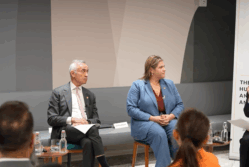Event Coverage Highlight

Journalists Discuss US Election at the American Library in Paris
by Chad Bouchard
The OPC and the American Library in Paris on Dec. 3 convened a panel of French and American journalists for an autopsy of the U.S. election in November, to discuss factors leading to President-Elect Donald Trump’s victory and what it means for for his coming term.
OPC member Vivienne Walt, Paris correspondent for TIME and FORTUNE magazines, moderated. She asked the panel of political correspondents if there was an “ah-ha” moment during the campaign when they might have suspected Trump would win.
Walt said she felt uneasy while watching the Democratic National Convention in August, which featured celebrities and a “sense of everybody being just so really self-congratulatory.”
“When [Kamala Harris] said in many ways Donald Trump is an unserious man – I thought that really doesn’t sound good to the ears of many Americans. Does that mean that their politics are not serious? Their complaints are not serious?”
Vivian Salama, a reporter for The Wall Street Journal who had been covering the campaign for a full year, said despite a late surge of support for Harris, when it seemed that “maybe women were turning out in greater numbers,” that a Trump victory felt like a strong possibility for months.
“Largely those of us who were on the campaign trail felt that Donald Trump was very well placed, maybe not for the sweeping victory that we saw but at least for a victory. I would say after the [debate between Trump and President Joseph Biden] everything kind of just went downhill.”
Richard Fausset, a reporter for The New York Times based in Atlanta who covered the Trump campaign closely, said when he got out of the campaign bubbles and talked to voters, he found signs that the electorate sawthe world differently than campaign organizers. He recalled talking to a young African-American man who had planned to vote for Trump because “Biden’s too old,” but now “I’ll give this new lady a try, I guess.”
“A lot of times the conversation where I live is dominated by white liberals and African-American power brokers,” he said. While the Harris campaign was focused on Trump’s “cardinal sin” of trying to overturn the 2020 election, “they’re judging this election on a very different kind of scale than this young man.”
Sylvie Kauffmann, a columnist for Le Monde and the paper’s former editor-in-chief, said following the announcement of Harris’ candidacy, she was surprised to see immediate support for her in media coverage.
“They were suddenly as enthusiastic about Kamala Harris as they were critical of her before. She was always described as a failed VP, and she didn’t make a mark, and she was and suddenly – wow – this wonderful star. Especially after the Democratic Convention. I thought – how can they switch so quickly?”
Ben Barnier, a senior correspondent for France Info TV who co-anchored a nightly program during the campaign’s final weeks and covered the Trump campaign, recalled attending an event at the Mar-a-Lago Club, when he approached a particularly vocal supporter who identified himself as gay and Latino.
“I’m like – let’s just stop for a minute. What you’re saying makes no sense to the people that are watching you in France. You’re gay and you’re Latino. You shouldn’t be voting for Trump – that’s what people are going to think in France,” Barnier said. “He’s like: ‘You know what? ‘I’m gay, I’m Latino. But I’m also American. And f**k you, I’m voting for whoever I want.”
Walt asked about the sense of panic from Trump’s opponents, and concerns about anti-democratic maneuvers he might wage after his inauguration.
Salama said she’s seeing worries about agencies like the Department of Justice, the Federal Bureau of Investigation, and “even some of the financial arms of the country, the Pentagon,” being weaponized against rivals.
“What we are seeing this time around versus the last time [after his 2016 victory] is that he and his team have familiarized themselves with the levers of government in a way that they can then shape the government according to their will,” she said. Salama said some of Trump’s early cabinet choices, such as Senator Marco Rubio for Secretary of State, calmed some of the opponents’ anxiety because he is at least a professional with relevant experience. “But then we’ve come to a point where there were other positions he has chosen – MAGA loyalists – people who are much more in line with the far-right viewpoint. And there is concern that he comes in with a grudge because of the impeachment inquiries against him in the first administration.”
Click the window below to watch a recording of the program.



